Four ways you can use the Elsevier Privacy Center: How Elsevier provides transparency for your personal data
December 7, 2023
By Ana Morzinger, IJsbrand Jan Aalbersberg

© istockphoto.com/Just_Super
The importance of data privacy
As researcher and author, you will know first-hand the importance of data privacy. After all, your research may well involve collecting and analyzing personal data, and it's crucial that these data are handled in a responsible and ethical manner. For instance, personal data should be minimized to the purpose for which they are collected and it should be clear what personal data are being collected and for what purposes they are being used.
At Elsevier we are similarly committed to these data privacy principles, and as operator of online services, we also have a duty to be transparent about the personal data that we collect from you, and to offer you simple mechanisms to see and control what data are or have been collected. This is a challenging undertaking given the many services in place and with the various types of personal data being stored such as search alerts, saved histories, or email preferences. We do not want to obfuscate by information overload but at the same time, we aim to give you a comprehensive overview of your data and choices.
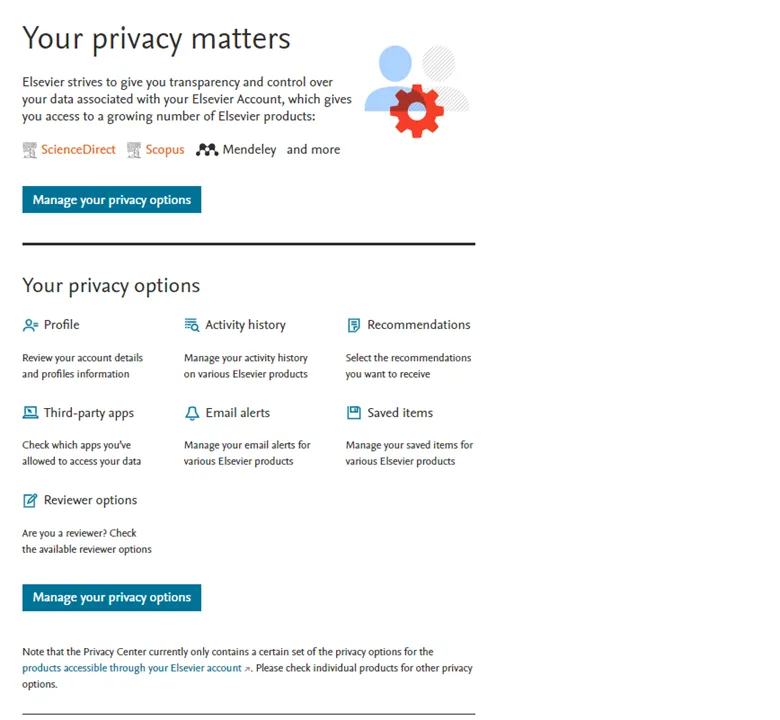
The Elsevier Privacy Center
To this end of providing personal data transparency, we built and are continuously improving and extending the Elsevier Privacy Center(opens in new tab/window). It has been designed with a clear focus – next to transparency – on choice, simplicity, and consistency and provides a central place in which you can view, understand, and manage your personal data and settings. So, what does the Privacy Center offer you? Let’s look at some of the things you can do…
1. Discover your email preferences.
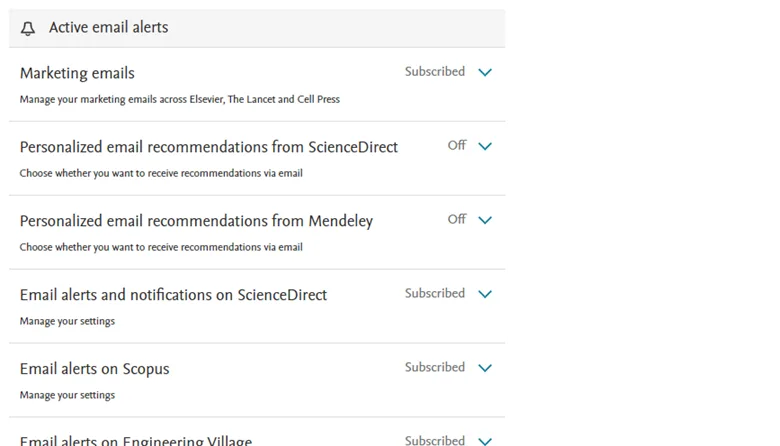
Elsevier offers you many services, and in some of these you might have indicated that you wish to receive email alerts, for example search or citation alerts, or announcements on new product features. In addition, you might have subscribed to newsletters (like Authors’ Update) or emails with offers and event information. We understand that it can be a lot, even confusing, and that you would appreciate a single mechanism for viewing and managing all the email subscriptions that you have set up. The Elsevier Privacy Center does just that: you can view, manage, and edit your email preferences to ensure your inbox reflects an experience tailored to your preferences.
2. Explore your editorial contributions.
... Sometimes, it is awkward to change preferences and manage data well.
The Elsevier Privacy Center certainly helps with that and is surprisingly easy to use. This is vital: too often, managing data options is so convoluted that individuals simply give up. Not so here, thankfully. This benefits everyone. Brendan Kelly. Editor-in-Chief of International Journal of Law and Psychiatry
Your scholarly contribution is defined by more than your authorship. As a researcher, you take on various roles, and they are all important to both the world of research as well as to your own career. Whether you're a reviewer, an author, or member of an Editorial Board, your contributions matter! In the Elsevier Privacy Center, within the "Editorial Manager" section, you can access your contribution history and view the roles you've played across different Elsevier journals. In short, you get a centralized overview of your publishing journey with Elsevier.
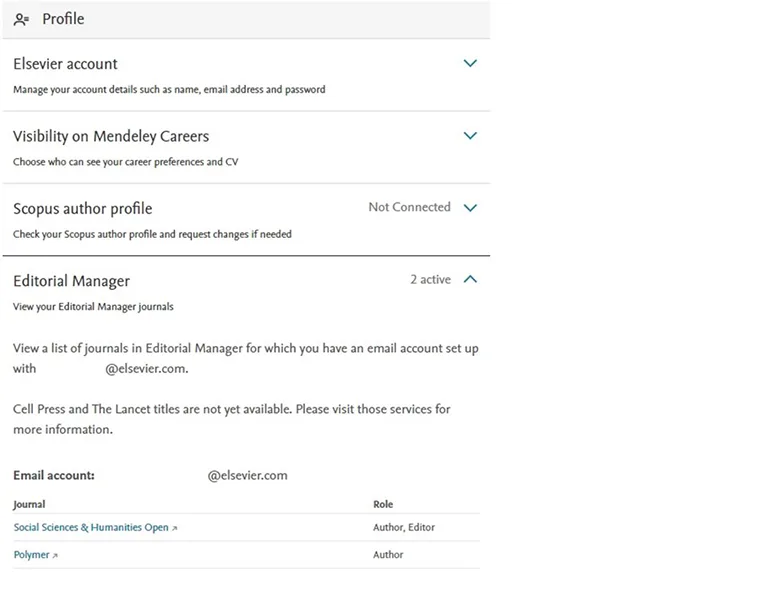
3. Discover and manage your activity history.
Products like ScienceDirect or Engineering Village maintain a search history of what queries you have raised or which documents have you read or downloaded. In Scopus you can also save your searches to save you time and not have to redo them. For your search history in ScienceDirect or Engineering Village - the Privacy Center indicates whether these settings are on or off. What’s more, we provide guidance on how to modify the settings or delete any data associated with your search histories.
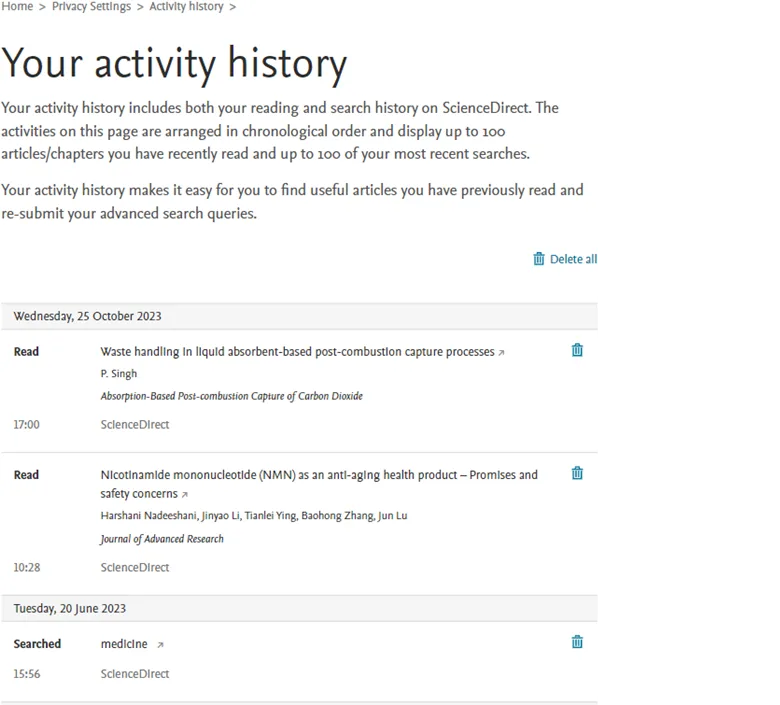
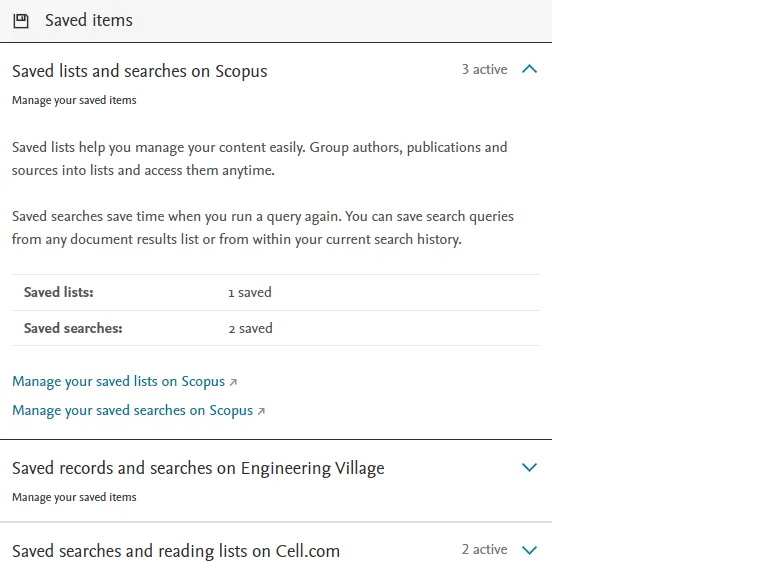
4. Control your digital footprint.
Our products are committed to following “privacy by design” and only use the personal data that is essential in delivering tailored services or features. It is our responsibility to ensure we deliver full transparency by indicating what personal data we are using and what type of value we are trying to create. In addition to letting you have the control, you decide if you want to use your personal data for these tailored features or services. The Privacy Center gives you a panoramic view of this transparency and control, detailing your digital footprint across products like Scopus, ScienceDirect, Editorial Manager, and Mendeley, and the unique value these features and services aim to bring to you.
Becoming the central place for your privacy needs
We have connected almost all Elsevier researcher products and their personal data settings with the Privacy Center, but we are still missing some, like Scival and SSRN. We will go on adding services and features, and are committed to continuously improving the Privacy Center.
Having the Privacy Center is not only a best practice; it’s an essential part of our integrity, user focus, and commitment towards delivering you the best services and experiences, all in a privacy-preserving environment. We are on the right track, as over 70% of our visitors in 2023 are satisfied with the Elsevier Privacy Center(opens in new tab/window). Why not take a look for yourself?!
Currently, the following Elsevier products and services are represented in the Privacy Center: ScienceDirect, Mendeley, Scopus, Editorial Manager, Cell.com, TheLancet.com, Elsevier Journals, Funding Institutional, Reviewer Hub, Researcher Academy, Journal Finder, Engineering Village and Marketing Preference Center.
Contributors

AM
Ana Morzinger

IJA